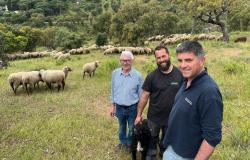When natives arose with their arcs and machetes, Daniel Braun and other Mennonites of the Peruvian Amazon fled through the rice fields, abandoning their barns in flames.
In Masisea, a locality that we reach after several hours of navigation on the Ucayali river, or by roads ravified by the rain, the mennonites are not only faced with the anger of the natives.
They also risk prison, accused of destroying the forest as part of their agricultural expansion.
One of the most opposite native communities for this ultra-religious group Protestant is that of Caimito, located on the banks of the Imiria lagoon.
About 780 SHIPIBO-KONIBO reside under relatively precarious conditions, living in fishing and small-scale agriculture.
In the evening, some gather in the only grocery store equipped with internet access thanks to solar panels.
Their territory covers nearly 5,000 hectares, a little less than 600 of which were “invaded” by the Mennonites, explains the indigenous chief Abner Ancon, 54.
“Mennonites build farms on municipal territory (…) They always deforest. What they are doing is a crime against the environment”, plague, blue shirt open to a white polo shirt.
The Mennonites, whose origin dates back to 16th century Europe, have established five prosperous colonies since their arrival in the Peruvian Amazon almost ten years ago.
Coming from Bolivia, those who settled in Masisea, on the border with Brazil, raise cattle and cultivate rice and soy on 3,200 hectares.
The “lack of land” and the “radical left” brought us to Masisea, sums up David Klassen, 45, one of the leaders of the colony, nourishing his pigs with whom he takes care with his five children from seven to 20 years old.
Today, they form an enclave of 63 families. In their houses, they do not have the internet and their electricity from petrol generators.
Self -sufficient and opposed to interbreeding, they use tractors in the fields or as a means of transport. They speak a German dialect and barely Spanish. Women wear long dresses and men of checkered shirts.
Since the beginning of the 20th century, the mennonites have founded just over 200 colonies in Latin America, notably in Argentina, Bolivia, Colombia, Mexico, Paraguay and now in Peru, according to a study by the Belgian academic Yann Le Polain.
In many of these countries, they face deforestation complaints.
In July, ten years after their installation in Masisea, the stability of their colony was suddenly questioned. Daniel Braun was seated with some of his family in front of a barn when a group of Shipibo-Konibo arose.
-“They entered with arrows, machetes and all that. They made us very scary. They told us +leave +,” he says. They “set fire,” said the 39 -year -old man with thick hands.
The incident did not make any victims.
Even today, the remains of a hangar and a barn emerge from newly planted rice fields.
Chef Shipibo Abner Ancon Ancon assures that the “native guard” has scares the mennonites without violence “.
In 2024, the prosecution charged 44 heads of family from this Mennonite community for the destruction of 894 hectares of primary forest and requested between eight and ten years in prison for each.
Their lawyer, Carlos Sifuentes, assures that the land bought when arriving were “already deforested” and that they are outside the territory of Shipibo-Konibo, which the latter dispute.
The mennonites have “hired” third parties to “brush” forest areas, so that they can then enter “with their tractors to flatten everything,” said their lawyer Linda Vigo.
The independent Monitoreo program of the Amazonia Andina (MAAP) estimates at 8,660 hectares the surface of forests deleted by the mennonites in Peru since 2017.
Barely a tiny part of the three million hectares of lost forests over the past three decades in the country, mainly due to fires, deforestation and illegal mining, according to the authorities.
“We love the countryside” and “we do not want to destroy everything,” says David Klassen in the midst of the green rice fields of the colony.
The Mennonite agricultural production model is not “completely in line with environmental expectations”, but the land they bought “were already devastated”, assures Pedro Favaron, of the Pontifical Catholic University of Peru.








